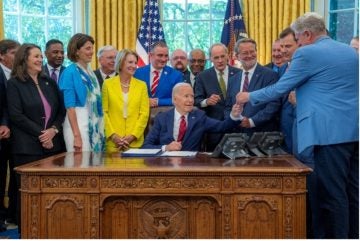
US President Joe Biden has signed into law the Fire Grants and Safety Act, which includes bipartisan legislation known as the Accelerating Deployment of Versatile, Advanced Nuclear for Clean Energy (ADVANCE). The legislation is expected to speed up the timeline for licensing new nuclear reactors and cut fees that companies have to pay to do so. It also requires the Nuclear Regulatory Commission (NRC) to put together a report that considers ways to simplify and shorten the environmental review process.
President Biden in a post on X and LinkedIn said: “Earlier, I signed the ADVANCE Act, a bipartisan win for American energy security, innovation, and achieving economy-wide, net-zero emissions by 2050. Clean nuclear power and good union jobs. That’s what the ADVANCE Act will help deliver.”
The ADVANCE Act builds on previous legislation to develop a modernised approach to licensing new reactor technologies. Many of the advanced reactors that use novel coolants present licensing challenges. The ADVANCE Act directs NRC to reduce certain licensing application fees and authorises increased staffing for NRC reviews to expedite the process.
It also introduces prize competitions that the US Department of Energy (DOE) can award to incentivise deployment. These awards are subject to Congressional appropriations but will cover the total costs assessed by NRC for first movers in a variety of areas, including the first advanced reactor to receive an operating or combined licence.
The ADVANCE Act directs NRC to develop guidance to license and regulate microreactor designs within 18 months. It eliminates costs associated with pre-application activities and early site permits at DOE sites or other locations deemed critical to US national security.
These provisions should expedite the demonstration and deployment of two microreactor projects that are being pursued by the US military. Alaska’s Eielson Air Force Base plans to build a microreactor at its site as early as 2027. The Defense Department aims to demonstrate a high-temperature gas reactor design at Idaho National Laboratory around the same time.
The Act also requires NRC to develop a pathway to enable the timely licensing of microreactors and nuclear facilities at brownfield and retired fossil-fuel energy generation sites.
On the international level, NRC is empowered to lead in international forums to develop regulations for advanced nuclear reactors. DOE is directed to improve its process for approving the export of American technology to international markets, while maintaining strong standards for nuclear non-proliferation.
The ADVANCE Act seeks to strengthen the US nuclear fuel cycle and supply chain infrastructure. NRC is directed to enhance its ability to qualify and license accident-tolerant fuels and advanced nuclear fuels that can increase safety and economic competitiveness for existing reactors and the next generation of advanced reactors. NRC is also tasked to evaluate advanced manufacturing techniques to build nuclear reactors better, faster, cheaper and smarter.
DOE noted: “The ADVANCE Act, along with the historic investments and tax incentives provided by the Bipartisan Infrastructure Law and Inflation Reduction Act, have truly reenergized our domestic nuclear power sector and repositioned us as a global leader on the technology we first developed. We’re excited to build on our established collaborations with the NRC to accelerate new reactor deployments in the United States and look forward to streamlining our efforts across the government to help build a new secure, clean energy economy that brings everyone along for the ride.”






